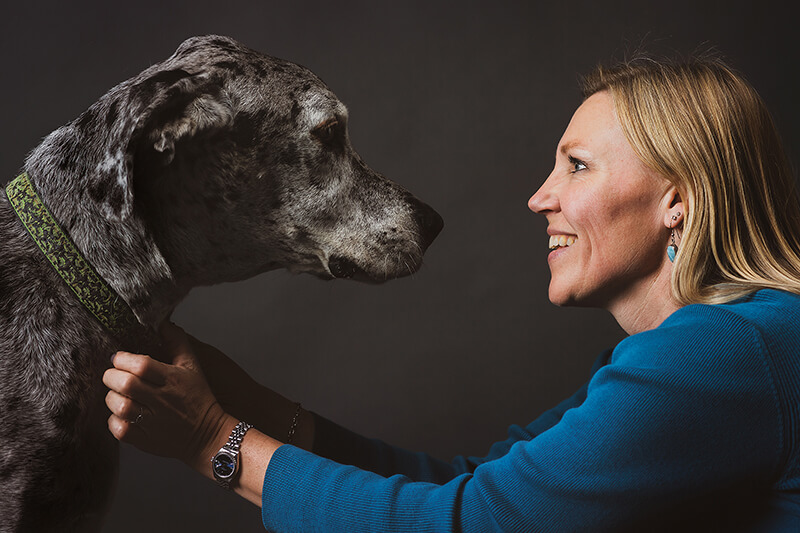December 5, 2019
Calling all dogs and dog owners: Your input is needed

Audrey Ruple, a veterinary epidemiologist and assistant professor of One Health Epidemiology in the College of Health and Human Sciences’ Department of Public Health with Bitzer, a Great Dane. (Purdue University photo/Rebecca Wilcox)
WEST LAFAYETTE, Ind. — Fido might be someone’s best friend and a beloved four-legged, furry family member, but now he can also sign on to be an important member of the scientific community.
More than 40 scientists and researchers from across the United States – including one from Purdue University – are looking for dogs to participate a national study regarding the general health and wellness of dogs.
The Dog Aging Project will be looking at dogs from all breeds and mixes from across the nation. This is the first major longitudinal study involving dogs and it's scheduled to last at least10 years.
“We are going to look at a lot of different aspects of dog’s lives that affect their health and longevity,” says Audrey Ruple, a veterinary epidemiologist and assistant professor of One Health Epidemiology in the College of Health and Human Sciences’ Department of Public Health.
“Dogs are good models for humans,” Ruple says. “They have similar genetics, share our environment, and they also have similar diseases and health issues. We will be asking, ‘How do dogs age healthfully?’ in order to help better understand how we can age healthfully, too.”
 Audrey Ruple, a veterinary epidemiologist and assistant professor of One Health Epidemiology in the College of Health and Human Sciences’ Department of Public Health with Bitzer, a Great Dane. (Purdue University photo/Rebecca Wilcox)
Download image
Audrey Ruple, a veterinary epidemiologist and assistant professor of One Health Epidemiology in the College of Health and Human Sciences’ Department of Public Health with Bitzer, a Great Dane. (Purdue University photo/Rebecca Wilcox)
Download image
Dogs of all age ranges, breeds and sizes are eligible to participate in the study. Owners can go online for more information and to register their dogs.
Once enrolled, owners will need to complete surveys about their dog’s health and lifestyle. Dogs will need to continue to visit their veterinarian for their regular annual examination. If a dog is assigned to a specific group, the owners may be sent a kit for the veterinarian to collect blood, urine or other samples during the annual visit. Participation is voluntary and there is no cost to participate.
“It’s important to get dogs from all parts of the U.S. because of the different environmental factors present,” Ruple said. “And we’re trying to find the oldest dog in America as well.”
All dogs registered will be eligible to participate in various studies. The group conducted a soft launch with 4,500 dogs registered earlier this fall. Recently, the researchers reached 75,000 dogs for the study.
“Our study population just keeps growing and growing and growing,” Ruple said.
Researchers hope to find out more details on how factors like an individual’s genome, proteome, microbiome, demographics and environmental factors such as chemical exposures and noise pollution impact health and longevity.
Ruple says one goal of the study is to not just improve the health and longevity of dogs, but also extend those findings to improve human health.
Currently, human health span – the period of our life that is spent in good health – does not match our life span – the entire amount of time we live. On average, men spend about 20% of their lifespan in poor health and for women that proportion is closer to 25%. “By studying aging in dogs, we hope to learn how to better match human health span to life span so that we can all live longer, healthier lives,” Ruple said.
Funding for the Dog Aging Project comes from the National Institute of Aging, a part of the National Institutes of Health, as well as from private donations.
Writer: Matthew Oates, 765-496-2571, oatesw@purdue.edu, @mo_oates
Source: Audrey Ruple, 765-496-0414, aruple@purdue.edu, @audreyruple

